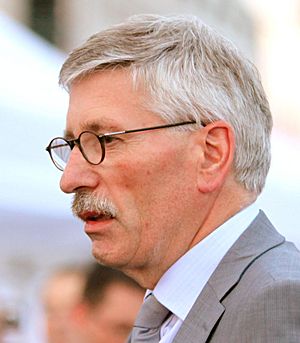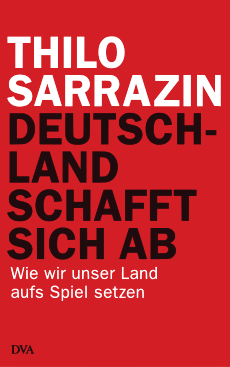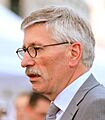Thilo Sarrazin facts for kids
Quick facts for kids
Thilo Sarrazin
|
|
|---|---|

Sarrazin in 2009
|
|
| Berlin Senator of Finance | |
| In office 17 January 2002 – 30 April 2009 |
|
| Preceded by | Christiane Krajewski |
| Succeeded by | Ulrich Nußbaum |
| Personal details | |
| Born | 12 February 1945 Gera, Thuringia, German Reich |
| Nationality | German |
| Political party | SPD (until 2020) |
| Spouse | Ursula (née Breit) |
| Alma mater | University of Bonn |
| Profession | Economist, politician, writer |
Thilo Sarrazin (born 12 February 1945) is a German politician and writer. He was a member of the SPD until 2020. He served as the finance senator for the State of Berlin from 2002 to 2009. He was also a member of the Executive Board of the Deutsche Bundesbank, which is Germany's central bank, until 2010.
Sarrazin became widely known after publishing a book in 2010. This book, called Deutschland schafft sich ab (which means Germany Abolishes Itself), discussed his views on Germany's immigration policy. It caused a lot of public discussion about the ideas of multiculturalism in Germany. Because of the strong reactions to his book, he is no longer a member of the SPD as of July 31, 2020.
Contents
About Thilo Sarrazin
Early Life and Education
Thilo Sarrazin was born in Gera, Germany, in 1945. His father was a doctor, and his mother came from a family of landowners. His family background includes French ancestors called Huguenots, as well as English and Italian relatives. He once described himself as having a "European mix" of backgrounds.
He grew up in Recklinghausen and finished high school there. After that, he completed his military service. From 1967 to 1971, he studied economics at the University of Bonn and earned his doctorate degree. He became involved in politics by working for the Friedrich Ebert Foundation and joining the SPD.
Career in Public Service
In 1975, Sarrazin began working for the German Federal Ministry of Finance. He also worked for the Ministry of Labour and Social Affairs for a few years. He returned to the Finance Ministry in 1981. There, he worked closely with important finance ministers like Hans Matthöfer.
Even after a change in government in 1982, Sarrazin stayed in the Finance Ministry. He led several departments, including one that helped prepare for the reunification of Germany. He also had some responsibility for German railways during this time.
From 1990 to 1991, Sarrazin worked for the Treuhand, an agency that managed former East German state-owned companies. Later, he was a State Secretary in the Ministry of Finance in Rhineland-Palatinate. He also served as the chief executive of a company called TLG Immobilien.
Working with Deutsche Bahn
Between 2000 and 2001, Sarrazin worked for Deutsche Bahn, which is Germany's national railway company. He was involved in planning and investments for the railway network.
Sarrazin supported the idea of making Deutsche Bahn more efficient. He believed the company should focus on being cost-effective. His relationship with the former CEO of Deutsche Bahn, Hartmut Mehdorn, was not very good. Sarrazin later left Deutsche Bahn after some disagreements.
Berlin's Finance Senator
In January 2002, Sarrazin became the Finance Senator for the city of Berlin. In this role, he focused on strict financial policies and saving money for the city.
His ideas about cutting social benefits often led to public discussions and protests. For example, he made suggestions about how people receiving welfare could manage their daily expenses. He also commented on how unemployed people might use more heating at home. Sarrazin also suggested that the government should prepare older citizens for a possible decline in their retirement income.
Role at Deutsche Bundesbank
On April 30, 2009, Sarrazin left his position as Berlin's Finance Senator. He was then appointed to the executive board of the Bundesbank, Germany's central bank. From May 2010, his duties at the Bundesbank included managing information technology and checking risks.
However, on September 2, 2010, he was removed from his specific duties. This happened after he made a controversial statement about Jewish genetics. The other board members wanted him removed from the Bundesbank. On September 9, 2010, Sarrazin asked the German President to let him leave his job at the Bundesbank.
Political Party Membership
In August 2010, the leaders of the Social Democratic Party (SPD) began to look into whether Sarrazin should remain a member. They felt his ideas might go against the basic values of the party.
An arbitration committee met in April 2011 and decided that Sarrazin could stay in the party. He stated that he never meant to go against social democratic values. He also said he never intended to suggest that social-Darwinist ideas should be used in politics. However, this decision did not please many SPD leaders.
The SPD started a third process to remove Sarrazin from the party after he published his book Hostile Takeover: How Islam Impedes Progress and Threatens Society. The party's committee in Berlin Charlottenburg-Wilmersdorf agreed with the SPD leadership. Sarrazin and his lawyers did not accept this decision and planned to appeal it. He officially left the SPD on July 31, 2020.
Personal Life
Thilo Sarrazin is married to Ursula Sarrazin, and they have two sons. He has a distinctive smile due to a medical operation he had in 2004. The operation was to remove a growth on a nerve in his inner ear, which affected the right side of his face.
His Views and Books
Immigration and Social Welfare
Sarrazin supports strict rules for immigration, especially for people who are not highly skilled. He also believes that government welfare benefits should be reduced. In September 2009, his ideas on economic and immigration policy in Berlin were published in a German cultural magazine. These ideas caused strong reactions.
In the magazine, he wrote that many Arab and Turkish immigrants were not trying hard enough to fit into German society. He said that he would not respect people who rely on welfare, do not respect the country that provides it, and do not focus on their children's education. He specifically mentioned this applied to a large percentage of Turkish and Arab people in Berlin.
In August 2010, Sarrazin's book Deutschland schafft sich ab (Germany Abolishes Itself) was published. It quickly became a bestseller. Within two months, it was the most popular political book by a German author in a decade. The first copies sold out very quickly. By May 2011, over 1.5 million copies had been sold.
In 2010, he was quoted as writing about Islam. He stated that no other religion in Europe makes so many demands. He also claimed that no other immigrant group, except Muslims, is so strongly linked to welfare and crime. He also wrote that no other group shows their differences so much in public, especially through women's clothing. He also suggested that in no other religion is the step towards violence, dictatorship, and terrorism so easy.
His book was criticized for saying that Germany's Muslim immigrant population was unwilling to integrate. It also claimed they relied more on social services than on being productive. He also suggested that their population growth could become very large compared to the German population. He proposed strict changes to the welfare system to fix these issues.
Discussions on Genetics
In 2010, Sarrazin caused a stir during an interview. He claimed that "all Jews share a certain gene like all Basques share a certain gene that distinguishes these from other people." He later expressed regret for the upset this caused. He explained that his information came from international media reports about a 2010 study on Jewish genetics.
In 2018, Sarrazin's statements were criticized by several political figures and organizations in Germany. The Central Council of Jews in Germany strongly criticized him, calling his views racist. The General Secretary of the SPD, Sigmar Gabriel, also condemned Sarrazin for his approach.
Freedom of Opinion
The publication of his book "Deutschland schafft sich ab" led to accusations that Sarrazin was promoting racism and xenophobia. This strong criticism inspired Sarrazin to write another book. This book was titled Der neue Tugendterror - Über die Grenzen der Meinungsfreiheit in Deutschland (The new terror of virtue - on the limits of freedom of opinion in Germany).
In this book, he discusses how political correctness works and the political atmosphere in Germany. He explains in one chapter how he felt he came into conflict with public opinion. He wrote, "I had expected a controversial discussion. But nothing had prepared me for the public storm that broke loose upon publication. I was accused of advocating biological determinism and labelled a social Darwinist, a racist, and an enemy of the people and of social justice."
Books by Thilo Sarrazin
- Deutschland schafft sich ab (2010)
- Europa braucht den Euro nicht (Europe doesn't need the euro) (2012)
- Der neue Tugendterror. Über die Grenzen der Meinungsfreiheit in Deutschland. (The new terror of virtue - on the limits of freedom of opinion in Germany) (2014)
- Wunschdenken. Europa, Währung, Bildung, Einwanderung – warum Politik so häufig scheitert (Wishful Thinking. Europe, Currency, Education, Immigration – why Politics so often Fails) (2016)
- Feindliche Übernahme: Wie der Islam den Fortschritt behindert und die Gesellschaft bedroht (Hostile takeover – how Islam impairs progress and threatens society) (2018)
Images for kids
See also
 In Spanish: Thilo Sarrazin para niños
In Spanish: Thilo Sarrazin para niños
 | Sharif Bey |
 | Hale Woodruff |
 | Richmond Barthé |
 | Purvis Young |



